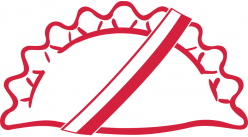Meaning:
Lit. “to cut/wound a tongue/language” as in Polish the “język” noun is used to convey both meanings. The expression is a metaphor used to describe someone speaking a language poorly and making many grammatical or lexical mistakes. You can hear it when Poles talk about a foreigner trying to use their language – or a Pole speaking bad English or German.
You could also say “skaleczył się w język” – he cut/wounded his tongue – no metaphor, just bloody facts. This sentence is pretty unequivocal due to the use of reflexive form of the verb with “się” (herself/himself).
